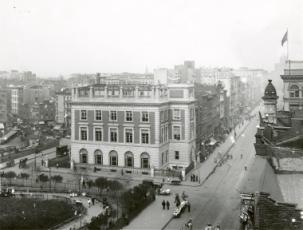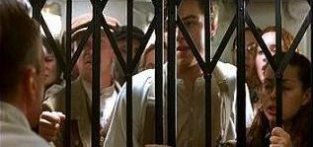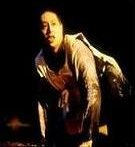THE EDUCATION OF ROSE DAWSON: PART II
Chapter Three
Erudition
Rose stepped back out onto the
street feeling dissatisfied with her performance in the interview and
disheartened that she was not hired, even though it was not her fault that she
did not possess the necessary language skills or ties with the local community
to win the job. As if to mirror her mood, a light rain had begun to fall,
largely emptying out the crowded streets and forcing her to open her umbrella.
With no other job interview scheduled for the day, she continued south on Essex
Street in the same direction she was headed before she overshot Mr.
Anielewicz’s office. She did not know where she was going. Returning to the
shelter was the logical choice, but for some reason, she did not want to go
back there so soon.
Mr. Anielewicz’s mention of a big
steamship accident eight years ago obviously brought back unpleasant memories,
but it also made her curious. Which one was that? It must have been very big
if Mr. Anielewicz still remembers it as if it happened yesterday. Will my own
ordeal still haunt me in eight years?
For a seventeen-year-old young
woman, 1920 seemed so far away.
Do not lose hope, Rose.
Remember what Miss Howard said. It’s a better day tomorrow.
Some half a dozen blocks later, she
saw what appeared to be a library on her left–a four-story Renaissance Revival
structure. She turned east on East Broadway, quickly entering the building at
its main entrance to escape the rain, and found that she was inside the Seward
Park branch of the New York Public Library. The NYPL was an amalgamation of several
smaller libraries, including one operated by one of the Astors’ ancestors. The main
branch was the one Rose and Miss Howard passed by during their trip to Fifth
Avenue the previous week. The Seward Park branch was considerably smaller, but
apparently no less popular with the public, judging from the number of people
who were inside.

The Seward Park branch (192 E.
Broadway) and vicinity circa 1912
After checking her coat and
umbrella, she went to look for a seat to read the rest of her copy of the Times.
She found one on the second floor, sat down, and began to browse through her
paper. For some reason, the mention on the front page of the discovery of the
bodies of sixty-four Titanic victims did not cause her to immediately
flip to another page. None of them can be Jack’s. I saw him sink into the
Atlantic after I let go of his hand. Headlines such as this one were sure
to be in the papers for some time to come, so Rose had to learn how to take
them in stride. Conquer your fears,
she had to remind herself.
Also on the front page was a story about J. Bruce Ismay testifying
at a government inquiry into the sinking that he boarded his lifeboat when
there were no other women and children around. He claimed to have not been the
only man in the lifeboat because a few other men boarded it as well, including
four Chinese men whom he later discovered hiding under its seats.
Ismay’s mention of the Chinese men made Rose think back to the few
hours she spent in her lifeboat, which she shared with one of them. Officer
Lowe had rescued him from the water just before he rescued her. Although the
Chinese man was dripping wet and freezing like Rose, he did not faint right
after being saved – a testament to his luck and stamina. While Rose was too
dazed to ponder her preferential treatment at the time, she later regretted it,
especially after Jack had already let her have the large, wooden panel to
herself. Even though it was considered proper etiquette for a gentleman to
defer to a lady when space was at a premium, Rose did not think she was any
different from any of the other 1,500 people who were unfortunate enough to be
immersed in the freezing
At daybreak, Rose recognized the Chinese man, even without his
glasses, as the same one with whom she and many other steerage passengers were
trapped behind a locked gate before Jack, Fabrizio, and Tommy ripped a bench
from the floor and used it to ram the gate down. Between then and just after
she was pulled aboard the lifeboat, she did not know what happened to him
except that he most likely remained on Titanic
until it had completely gone under and, like Rose, miraculously survived the
icy waters of the Atlantic by floating on a piece of debris. Once aboard the Carpathia, she saw him huddled with his
five fellow Chinese survivors. No one had much to say to them, and she did not
understand what they said among themselves.


(L) Chinese man (with glasses) standing behind Rose as Jack
calls for the gate to be opened; (R) Same man being picked up by Officer Lowe just
before he picks up Rose
Rose recalled a conversation she had with Amy Stanley about the
Chinese during a lull when Mrs. Abbott managed to fall asleep and did not
require the company of either woman. Miss Stanley was indignant over finding
that half a dozen of them had survived, while so many other men, women, and
children perished.
“I heard some of them rushed
the lifeboats and refused to get out, even after the ship’s officers threatened
to shoot them. But the officers were afraid of hitting the women and children,
so they let them remain on the boats. Then they hid under the seats.”
“Are you sure, Miss Stanley?
It did not seem very roomy down there.”
“Well, that’s what I heard, Rose.
And seeing how small a few of them are, I don’t think it was too hard for them
to crawl under.”
Rose had never had much interaction with Chinese people, but to
hear Miss Stanley liken them to some form of troglodytical lowlife seemed hard
to believe. That compelled her to challenge her new friend by saying something
on behalf of all Titanic passengers
and crew who tried desperately to survive after having been denied a seat in a
lifeboat, with most failing in the end.
“Suppose the rumor is true.
If some of them really hid under the seats, that would mean none of them
occupied a seat that could have gone to a woman or child, right? Besides, most
boats were launched before they filled up, some at less than half their
capacity. That was not the fault of the Chinese.”
“Hmm, maybe you have a
point. But it’s so unfair when so many better men could have lived!”
“The Chinese are not the
only men alive right now. Where is Mr. Ismay at this moment, if not hiding in
his cabin? Would you call him a better man?”
“Certainly not.”
“Exactly, Miss Stanley. Not
all of the Chinese who survived made it to a lifeboat before the ship
foundered. One of them was rescued from the water just before I. Does he not
deserve to live? Surely he is a better man than a few others who survived.”
“I…I see, Rose. Maybe I was too hasty in my judgment. Anyone who can survive those freezing waters deserves to live…and my respect.”
Among the “few others who survived” was
As for the Chinese, Rose did not recall seeing them disembark at
Pier 54 on the evening of the 18th. She did not think much of it at
the time, since she had to deal with more important matters. Now, she wondered
if they had even set foot on
"Well, I didn’t expect to
see you down here, Rose," a voice whispered on the right.
Rose turned that way and saw that
it was Amsterdam standing before her. "Amsterdam. How are you today? How
is your nose feeling?"
"Never felt better. I think the
trickster actually did me a favor by clearing up my sinuses. What are you doing
this far downtown?"
"I attended a job interview
on Essex Street, but it was unsuccessful."
"Those things can be really
unpleasant. I should know," said Amsterdam.
"My interviewer was not too
hard on me," said Rose, as she recalled watching Mr. Anielewicz’s sudden
display of emotion. "Where is Jenny?"
"She’s upstairs on the top
floor. Let’s go find her."
They went to the top floor to
find Jenny sitting down reading a magazine. She smiled when she saw Rose.
"What a pleasant surprise. What are you doing here, Rose?"
Rose smiled back. "Good
morning, Jenny. I was at a job interview, but no luck. How are you feeling
today?"
"A lot better, I think. You
just keep trying, my dear. And be patient. You’ll find something."
"I hope so, Jenny. Do the
two of you come to the library often?"
"Sometimes. I never had much
chance to use one when I was your age, while Amsterdam did most of his reading
at the Hellgate House of Reform on Blackwell’s Island. He actually reads better
than me."
Rose looked at Amsterdam
curiously. "Reform? What did you need to reform about yourself?"
"My peacemaking
skills," said Amsterdam in partial jest. He cupped his right fist with his
left hand. "I put them to good use yesterday, wouldn’t you agree?"
Jenny rolled her eyes at this mix
of braggadocio and sarcasm, while Rose gave Amsterdam an amused grin. "You
are a belligerent one," she said, "but you were right to behave that
way yesterday." Then she turned and looked at the large number of people
using the library. "This branch must be a popular place."
"Libraries are always
popular when the weather is bad," said Jenny. She looked out the window.
"The rain seems to be letting up. Would you like to join us for lunch, Rose?"
"I think that would be a
good idea."